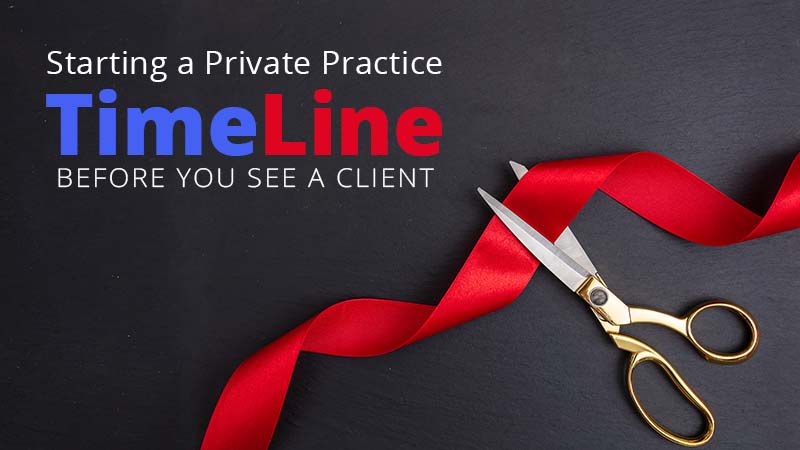I am frequently asked about what to do and when to do it. So, I have developed a timeline on what to do before you see a client.
Now
Business/confidence Mindset: Successful therapists in private practice have confidence, believe in themselves and have adopted a business paradigm. Since you will be essentially selling yourself and your abilities, an accurate self-appraisal is imperative. Not only are you a practice owner you are a business owner!
Support: Do not be reluctant to ask for help. Find a mentor or consultant, FB group(s), consultation group, lean on friends and family, other professionals i.e., CPA and attorney. Private practice can be isolating even if you are forming a small group practice with others.
Develop Content: You will need content for presentations, print material, websites and other social media for yourself as well as for clients. Information about yourself, how you practice, theoretical orientation (in layperson terms), what clients can expect from you and your practice. Client homework assignments, useful information, and resources for the type of client you want to treat. General mental health information and useful tips to manage symptoms. You get the idea.
Know What You Don’t Know: Business, accounting, HIPAA, marketing/advertising, state practice laws. Take a class/workshop. Go to YouTube for private practice videos, FB groups (TIPP) and google “counseling private practice” for lots of free info. Join your state counseling association and mental health division. Don’t let your membership lapse! This is one of the best private practice resources for what you don’t know. Better yet, volunteer!
Four Months Out
Business Entity: Decide business structure for your practice. Consult an attorney and CPA. Sole Proprietor Professional Limited Liability Corp. Sub Chapter S Corp.
Practice Numbers:
- Get Tax ID (EIN) number https://www.irs.gov/
- Get NPI(s) https://nppes.cms.hhs.gov/#/ even if you don’t plan on billing insurance.
- Get CAQH ID number if you will be applying to insurance companies. All practice information is stored online. https://proview.caqh.org/
Apply to Insurance Companies: If you are going to accept insurance, decide which ones and apply to be paneled. Go to each insurance company website and click on provider relations.
For the above it is best to have an office address but not essential. You can wait for a while to save money. You can use a colleague address or get a mailbox (not a P.O box) at a pack and send store and change it later.
Two to Three Months Out
Business Address: Rent or sublease office space or address for telehealth only.
Phone: Acquire business phone number
Practice Forms: Develop or acquire business forms: Informed consent, HIPAA, Telehealth, Transfer plan, Releases, BAA, Fee schedule, Intake, HIPAA policies and procedures, etc.
Social Media: Decide which of the following you want to use and sign up. There is a little bit of a learning curve so have time to learn it or hire it done. A Website and Search Engine Optimization is a must so spend some money on a high-quality website. Start now to have it ready in two months.
- Facebook.com
- Youtube.com
- LinkedIn.com
- Twitter.com
- Instagram.com
- Webinars
- Podcasts
- Blogs
- E-mailing i.e.., constantcontact.com or mailchimp.com
- List Serv
Referral Sites: Psychologytoday.com is the most popular
- Psychologytoday.com
- Findatherapist.com
- GoodTherapy.com
- TherapyTribe.com
- Networktherapy.com
- Professional Organizations
One Month Out
Malpractice Insurance: Get from your professional organization: APA, AMHCA/ACA or NASW. Minimum $1,000,000 – $3,000,000.
Record Keeping: While paper is still acceptable, I would recommend an Electronic Medical Record (EMR) All in one Charting, Billing: Clients and Insurance, Credit Cards, Client Portal, Scheduling, Telehealth platform.
- SimplePractice.com
- Therapynotes.com
- Theranest.com
Finances: How to manage your money
- Accounting: Quicken.com or EMR
- Business Bank Account: Checking and Credit card
- Billing: If not using an EMR
- OfficeAlly.com
- Availity.com
- Billing Company
- Credit Card Processing: Good idea to accept credit cards.
- Square.com
- Paypal.com
- Talktoivy.com
- Payment Apps:
- Zelle Pay
- Venmo
Print Material: Do it yourself or Vistaprint.com
- Letterhead
- Business Cards
- Brochure (?)
Now you will be confident and prepared to open your private practice.

